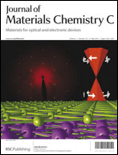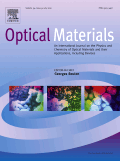
Functional Materials
Scope & Guideline
Exploring the Future of Materials Science.
Introduction
Aims and Scopes
- Advanced Energy Storage Materials:
Research on innovative materials for batteries and supercapacitors, including lithium-ion, sodium-ion, and zinc-ion batteries, focusing on improving energy density, cycling stability, and charge/discharge rates. - Photonic and Optoelectronic Materials:
Development of materials for applications in light-emitting diodes, lasers, and photodetectors, with a specific focus on enhancing efficiency, stability, and response times. - Biomimetic and Bioinspired Materials:
Investigation of materials and structures that mimic biological systems, aiming to create innovative solutions for medical applications, such as drug delivery and tissue engineering. - Nanostructured and Composite Materials:
Exploration of nanomaterials and their composites, focusing on their unique properties and potential applications in various fields such as catalysis, sensing, and environmental remediation. - Smart and Responsive Materials:
Study of materials that respond dynamically to external stimuli, enabling applications in soft robotics, sensors, and adaptive systems. - Environmental and Sustainable Materials:
Researching materials that address environmental challenges, including waste reduction, pollution control, and energy efficiency.
Trending and Emerging
- Hybrid and Composite Materials:
There is a significant increase in research on hybrid materials that combine various components, such as metals, polymers, and nanomaterials, to enhance performance in energy storage, catalysis, and sensing. - Self-Healing and Adaptive Materials:
Emerging interest in materials that can heal themselves or adapt to environmental changes, which is crucial for applications in soft robotics, electronics, and biomedical devices. - Sustainable and Green Materials:
Growing focus on materials that are environmentally friendly, including biodegradable and recyclable options, reflecting a broader societal shift towards sustainability. - Advanced Coatings and Surface Engineering:
Increased emphasis on the development of advanced coatings that improve material performance, such as wear resistance, corrosion resistance, and functionality in various environments. - Machine Learning and AI in Materials Science:
Integration of machine learning and artificial intelligence in material design and discovery processes, enhancing the efficiency and effectiveness of research methodologies.
Declining or Waning
- Traditional Energy Materials:
There has been a noticeable decrease in publications focused solely on conventional energy materials, such as standard lithium-ion batteries, as researchers shift towards more advanced and sustainable alternatives. - Single-Function Materials:
Research on materials designed for a single function (e.g., solely for energy storage or solely for photonics) is decreasing, as the trend moves toward multifunctional materials that can serve multiple applications. - Low-Tech Applications:
The journal has seen fewer papers on basic or low-tech applications of functional materials, reflecting a trend towards high-tech, innovative solutions that address current global challenges.
Similar Journals

Emergent Materials
Unveiling the Future of Sustainable Materials.Emergent Materials is a leading journal in the fields of biomaterials, ceramics, composites, and environmental science, published by SpringerNature. With an ISSN of 2522-5731 and an E-ISSN of 2522-574X, this journal serves as a crucial platform for researchers and professionals seeking to publish their findings on innovative materials that drive advancements across various applications. Renowned for its impactful contributions, Emergent Materials currently holds a Q2 ranking in Biomaterials and Waste Management, and a prestigious Q1 ranking in Ceramics and Composites for 2023, showcasing its excellence in these dynamic fields. Positioned within Switzerland, the journal supports a wide array of open access research initiatives, allowing for greater dissemination and accessibility of critical scientific knowledge. Spanning over the years 2018 to 2024, the journal aims to publish groundbreaking studies that address global challenges in sustainability, energy, and material disposal. With an impressive Scopus ranking highlighting its impactful presence, generate compelling insights and stay at the forefront of material sciences with Emergent Materials.

Accounts of Materials Research
Transforming research into impactful materials advancements.Accounts of Materials Research is a premier journal published by the American Chemical Society, focusing on the multidimensional field of materials science. With a robust impact factor and a commitment to open-access research, it serves as a vital platform for leading-edge discoveries from 2020 to 2024. The journal has rapidly ascended to the top quartile in multiple categories, including Chemical Engineering, Materials Chemistry, and Polymers and Plastics, demonstrating its significant influence within the academic community. Recognized by Scopus as a key resource—with remarkable rankings that place it in the 95th percentile of its field—Accounts of Materials Research is devoted to publishing high-quality, innovative research that addresses critical challenges in materials development and implementation. This journal is essential for researchers, professionals, and students seeking to stay informed about the latest advancements and collaborative opportunities within the interdisciplinary landscape of materials science.

ACS Materials Letters
Catalyzing Progress in Cutting-edge ResearchACS Materials Letters is an esteemed peer-reviewed journal published by the American Chemical Society, emphasizing groundbreaking research and advancements in the fields of materials science, biomedical engineering, and chemical engineering. With a robust update and established reputation since its inception in 2019, this journal has rapidly ascended to the top tiers, achieving Q1 rankings in key categories such as Biomedical Engineering, Chemical Engineering (miscellaneous), and Materials Science (miscellaneous) in 2023. The journal boasts impressive Scopus rankings, including #14 in General Chemical Engineering and #19 in Biomedical Engineering, placing it among the elite publications in these domains. While not fully open access, ACS Materials Letters facilitates the dissemination of high-impact research accessible to academics and industry professionals alike. With its comprehensive scope and rigorous selection process, the journal serves as a vital resource for researchers and students eager to stay abreast of the latest innovations and technologies shaping materials science and engineering.

Frontiers in Materials
Exploring New Horizons in Materials Innovation.Frontiers in Materials, an esteemed journal published by FRONTIERS MEDIA SA, is a leading platform in the field of Materials Science, with a notable impact factor placing it in the Q2 category of its discipline as of 2023. Since its establishment as an Open Access journal in 2014, it has fostered considerable academic exchange, allowing researchers from around the globe to share their innovative findings and insights. Based in Lausanne, Switzerland, this journal not only emphasizes high-quality peer-reviewed articles but also prioritizes rapid dissemination of research, as evidenced by its commendable Scopus ranking of #62 out of 196 in Materials Science (miscellaneous). By consistently striving to bridge the gap between academia and practical applications, Frontiers in Materials serves as an invaluable resource for researchers, professionals, and students seeking to delve into cutting-edge advancements and transformative applications in materials science.

Nano Express
Unlocking the potential of next-generation materials.Nano Express is an esteemed open-access journal published by IOP Publishing Ltd, dedicated to advancing research in the fields of nanotechnology and materials science. Since its launch in 2020, the journal has swiftly established itself as a vital resource for researchers and professionals, garnering significant recognition in various domains, including biomaterials, electronic, optical and magnetic materials, and polymers and plastics. With a commendable categorization in Scopus quartiles, it ranks in Q2 for Electronic, Optical and Magnetic Materials, and maintains a top percentile in several others, exemplifying its commitment to high-quality research dissemination. Located in the United Kingdom, this journal fosters a global dialogue among experts and newcomers alike, facilitating open access to innovative research that drives the future of nanotechnology. By offering a platform for groundbreaking studies and reviews, Nano Express aims to bridge the gap between theoretical understanding and practical application, championing the development of next-generation materials that have the potential to transform various industries.

Frontiers of Materials Science
Transforming Ideas into Reality in Materials ResearchFrontiers of Materials Science is a groundbreaking journal dedicated to exploring advanced materials and their applications within the ever-evolving landscape of materials science. Published by HIGHER EDUCATION PRESS, this journal offers a crucial platform for scholars and practitioners seeking to disseminate innovative research findings that foster interdisciplinary collaboration. Since its inception in 2011, the journal has enjoyed a notable Q2 ranking in the category of Materials Science (miscellaneous) as of 2023, positioning it among the noteworthy publications in the field with a Scopus rank of #222 out of 463. While predominantly published in China, the journal is committed to open access principles, allowing global accessibility to cutting-edge research. With its comprehensive coverage spanning materials synthesis, characterization, properties, and applications, Frontiers of Materials Science not only serves as a repository for academia but also bridges the gap between research and industry, making it an indispensable resource for researchers, professionals, and students alike.

Journal of Materials Chemistry C
Catalyzing Discoveries in Materials ChemistryJournal of Materials Chemistry C, published by the renowned Royal Society of Chemistry, is a leading academic journal focusing on innovative research in the field of materials chemistry. With an impressive impact factor, this journal has solidified its status as a top-tier publication within its field, ranking in the Q1 category for both Chemistry (miscellaneous) and Materials Chemistry as of 2023. Positioned at the forefront of -materials science, it serves as a vital platform for researchers, professionals, and students to disseminate findings that highlight the synthesis, characterization, and application of advanced materials. The journal's open access model allows for broader readership and engagement, ensuring that groundbreaking research is accessible to a global audience. As a result, the Journal of Materials Chemistry C plays a crucial role in advancing the understanding and technology of materials, fostering collaboration and innovation within this dynamic scientific community.

BULLETIN OF MATERIALS SCIENCE
Advancing the Frontiers of Materials ScienceBulletin of Materials Science, published by the Indian Academy of Sciences, is a distinguished journal that has been contributing to the field of materials science since its inception in 1979. With an ISSN of 0250-4707 and E-ISSN 0973-7669, it provides a platform for researchers to share groundbreaking studies and advancements in the mechanics of materials and general materials science. As of 2023, the journal holds a respectable Q3 ranking in both the Materials Science (miscellaneous) and Mechanics of Materials categories, highlighting its competitive position in the academic landscape. Although the journal currently does not operate under an open access model, it remains a vital resource for professionals and students keen on exploring innovative material developments and methodologies. With a commitment to promoting high-quality research, the Bulletin of Materials Science features rigorous peer-review processes, making it an essential reference for anyone engaged in the materials science domain.

ADVANCED FUNCTIONAL MATERIALS
Transforming Ideas into Advanced Functional SolutionsADVANCED FUNCTIONAL MATERIALS is a leading journal published by WILEY-V C H VERLAG GMBH, prominently recognized in the fields of biomaterials, chemistry, condensed matter physics, and materials science. With an impressive impact factor and a distinguished position in the Q1 quartile across multiple categories including nanoscience and nanotechnology, this journal serves as a vital platform for researchers and professionals committed to innovating in functional materials. Since its inception in 2000, ADVANCED FUNCTIONAL MATERIALS has published high-quality peer-reviewed articles that push the boundaries of materials science, exploring new frontiers in electronic, optical, and magnetic materials. The journal's dedication to open access ensures that its groundbreaking findings are readily available to a global audience, fostering collaboration and knowledge-sharing among scholars and practitioners in the field. For those seeking to stay at the forefront of materials research, ADVANCED FUNCTIONAL MATERIALS is an essential resource.

OPTICAL MATERIALS
Bridging Disciplines with Optical ResearchOPTICAL MATERIALS is a peer-reviewed journal published by Elsevier, focusing on the intricate field of optical materials within various scientific domains including atomic and molecular physics, electronic engineering, and chemistry. With an impact factor indicative of its relevance, it ranks in the Q2 category across multiple areas such as Electrical and Electronic Engineering, and Inorganic Chemistry, highlighting its critical position in advancing research and innovation. Established in 1992 and continuing its contribution until 2024, this journal serves as a vital resource for researchers and professionals aiming to disseminate significant findings in material sciences, particularly those related to optical properties and applications. While it does not offer open access, the journal remains essential for academia and industry alike, ensuring the continued exchange of valuable knowledge in this rapidly evolving field.